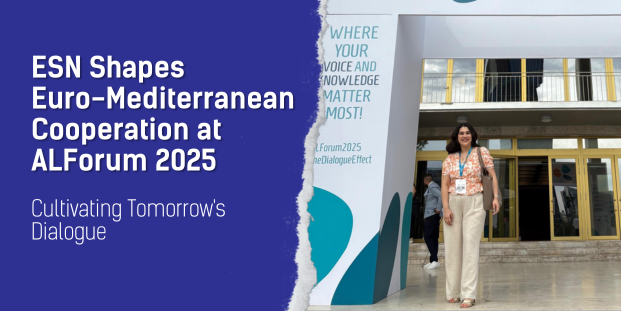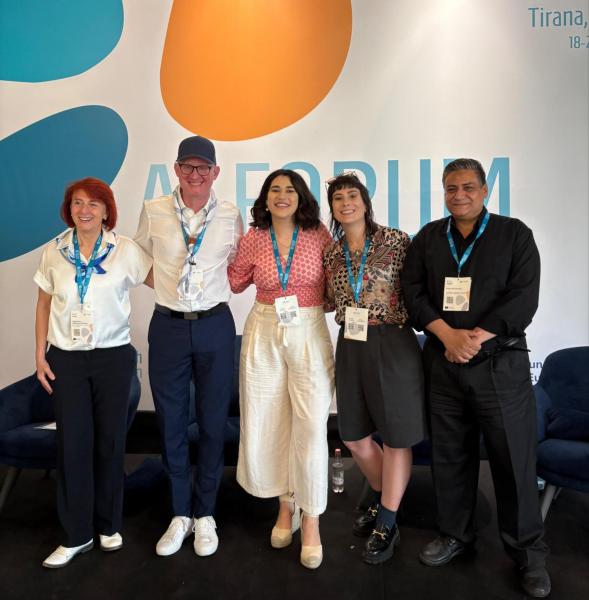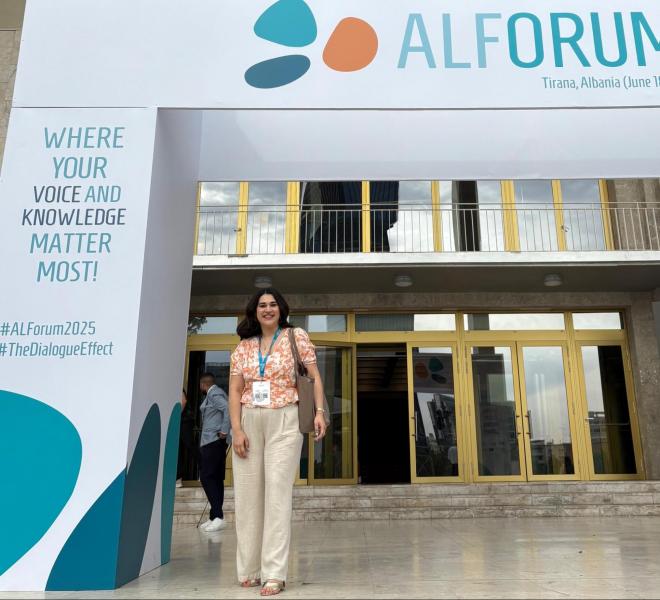
From 18 to 20 June 2025, Tirana hosted ALForum 2025, the Anna Lindh Foundation’s flagship gathering for intercultural dialogue across the Euro‑Mediterranean region.
Marking 20 years of the Foundation and 30 years of the Barcelona Process, the Forum convened over 1,000 participants, including civil society, academia, policymakers, cultural practitioners, and youth leaders from 43 countries, to “turn knowledge into action” under the theme “The Dialogue Effect”.
For the first time, Erasmus Student Network (ESN) participated in the Anna Lindh Forum, playing a central role and embedding the student voice in high‑level policy debates and showcasing Youth‑Led initiatives as engines of regional cooperation. ESN’s presence underscored how student mobility and grassroots collaboration can reshape Euro‑Mediterranean relations, from institutional frameworks down to local communities.
Indeed, the event marked a defining moment for youth leadership in Euro-Mediterranean cooperation, with ESN playing a crucial role as both convener and policy innovator. As moderator of the strategically significant session “Seeds of Dialogue: Youth-led Tools for Trust and Transformation”, we witnessed how young change-makers are dismantling barriers across our region’s complex landscape.
The session united practitioners like Diana Bebenova-Nikolova (Parallel-Silistra NGO), Jon Rasmussen (Scout Movement), Maz Bednarczyk (Cultural Vistas), and Nageh Hosni Ali Khalifa (Egyptian Youth Association) to dissect concrete methodologies, from digital peacebuilding to grassroots education, that counter cultural fragmentation. Central to our discourse were two pressing questions: how youth initiatives can achieve institutional sustainability, and which tools most effectively bridge polarised societies.
The debate illuminated critical gaps in Euro‑Mediterranean policy: while diplomatic channels remain essential, sustainable cooperation hinges on empowering youth as co‑creators of cultural and educational projects.

Beyond the session, ESN’s influence resonated throughout the forum. Our published research on Gaza’s higher education crisis directly informed policy dialogues with the European Commission’s DG MENA, reinforcing calls for crisis-resilient academic frameworks. Notably, exchanges with HRH Princess Rim Ali, president of Anna Lindh Foundation, crystallised the youth’s indispensable role in operationalising the new Mediterranean Pact. These high-level engagements were complemented by 15+ strategic connections with Middle Eastern and North African organisations, laying the groundwork for future collaboration.
ESN’s intervention at ALForum 2025 drew on its proven track record and validated its regional approach through tangible evidence:
- ESN Survey XV (2024), the largest student‑led survey on Student mobility, revealed that 73 % of Euro‑Med exchange alumni maintain ongoing cross‑border collaborations, debunking assumptions of transient engagement.
- Mediterranean Student Summit, in partnership with UNIMED, convened over 20 students across both shores of the Mediterranean, fostering regional cooperation on higher education and youth participation in university.
By sharing the plenary platform with heads of state and regional directors, ESN pointed out that student and Alumni networks are not merely beneficiaries but strategic partners in Euro‑Mediterranean cooperation. ESN’s model, from large‑scale surveys to local innovation labs, demonstrated how bottom‑up initiatives can inform, enrich, and sustain top‑down policies.

ALForum 2025 in Tirana marked a turning point: youth organisations like ESN are now fully integrated into the highest echelons of Euro‑Mediterranean dialogue. As the Anna Lindh Foundation and the European Commission will take into consideration the forum’s debates into action, ESN stands ready to co‑design future agendas, foster cross‑border student projects, and ensure that today’s seeds of dialogue flourish into a resilient Mediterranean community.


Follow ESN